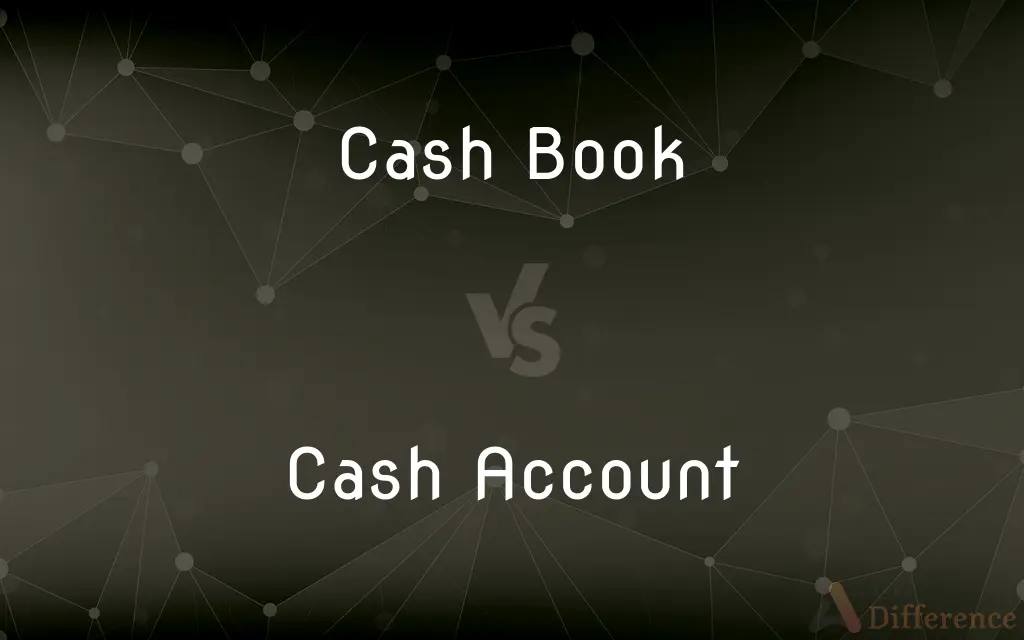Cash Book vs. Cash Account — What's the Difference?
By Tayyaba Rehman — Published on November 26, 2023
Cash Book is a specialized ledger recording all cash transactions. Cash Account is an account within ledgers, reflecting cash at hand and bank balances.

Difference Between Cash Book and Cash Account
Table of Contents
ADVERTISEMENT
Key Differences
The Cash Book is a unique kind of accounting book. It functions as both a ledger and a journal. In the Cash Book, all cash transactions, be they receipts or payments, are recorded in a chronological order. Being a primary book of entry, the Cash Book facilitates direct posting into ledger accounts, eliminating the need for a separate journal.
Conversely, the Cash Account is a specific account found within the general ledger or other subsidiary ledgers. This account tracks the cash in hand and any cash balances in bank accounts. Every transaction that affects the organization's cash position would result in an entry in the Cash Account. Its balance indicates liquid assets, readily available for use.
The distinction between the Cash Book and Cash Account is in their function and scope. The Cash Book offers a detailed record of all cash-related transactions, whereas the Cash Account provides a summarized record of cash inflows and outflows. While the Cash Book is considered both a primary book of entry and a ledger, the Cash Account is strictly an account in the ledger.
A business might maintain several Cash Books, segregating based on the nature of transactions, like petty cash or main cash. The Cash Account, however, is a consolidation, providing a bird's-eye view of the organization's cash position at any given point.
In essence, the Cash Book and Cash Account, though closely related, serve distinct purposes in the accounting process. The Cash Book ensures a comprehensive recording of cash transactions, while the Cash Account depicts the cash's summarized position in the financial statements.
ADVERTISEMENT
Comparison Chart
Nature
Both a ledger and a journal.
An account within the general/subsidiary ledger.
Purpose
Detailed recording of cash transactions.
Summarized record of cash inflows and outflows.
Scope
All cash transactions chronologically.
Reflects cash at hand and bank balances.
Variants
Can have variants like petty cash book.
Typically one primary cash account.
Function in Accounting
Primary book of entry and ledger.
Account in the ledger reflecting cash position.
Compare with Definitions
Cash Book
A primary accounting record for cash transactions.
Sarah maintains a meticulous Cash Book for her small business.
Cash Account
Summarized view of all cash inflows and outflows.
Regularly reconciling the Cash Account ensures financial accuracy.
Cash Book
Can have specialized variants.
The petty Cash Book helps track minor expenses.
Cash Account
Reflects transactions impacting cash position.
Any cash-based transaction affects the Cash Account.
Cash Book
Functions as both a ledger and a journal.
The versatility of the Cash Book eliminates the need for a separate journal.
Cash Account
Essential for preparing financial statements.
The Cash Account balance is crucial for the balance sheet.
Cash Book
Chronological recording of cash receipts and payments.
All entries in the Cash Book are date-stamped for accuracy.
Cash Account
A ledger account representing cash in hand and bank.
The balance in the Cash Account showcases liquid assets.
Cash Book
Can be directly posted to ledger accounts.
The Cash Book's entries save time by bypassing the journalizing step.
Cash Account
Provides an at-a-glance cash position.
Before making a purchase, Jacob checks the Cash Account balance.
Common Curiosities
What is a Cash Account used for?
The Cash Account provides a summarized view of cash in hand and bank balances.
Where is the Cash Account located?
The Cash Account is an account within the general or subsidiary ledger.
Does every cash transaction go into the Cash Book?
Yes, all cash receipts and payments are recorded in the Cash Book.
What's the significance of the balance in the Cash Account?
It indicates the total liquid assets available to the organization.
Is the Cash Account affected by credit transactions?
No, only cash transactions impact the Cash Account.
Can there be multiple Cash Books?
Yes, businesses might maintain different Cash Books like main and petty cash.
How often should the Cash Book be updated?
Ideally, the Cash Book should be updated as soon as a cash transaction occurs.
Can I ascertain my company's liquidity from the Cash Account?
Yes, the Cash Account balance reflects the readily available cash assets.
What is a Cash Book?
A Cash Book is a primary accounting record documenting all cash transactions.
Can the Cash Book replace the journal?
Yes, the Cash Book acts as both a ledger and a journal for cash transactions.
Why is the Cash Book considered unique?
Because it functions as both a journal and a ledger, unique to cash transactions.
Share Your Discovery

Previous Comparison
FedEx vs. UPS
Next Comparison
Electronegativity vs. Electron AffinityAuthor Spotlight
Written by
Tayyaba RehmanTayyaba Rehman is a distinguished writer, currently serving as a primary contributor to askdifference.com. As a researcher in semantics and etymology, Tayyaba's passion for the complexity of languages and their distinctions has found a perfect home on the platform. Tayyaba delves into the intricacies of language, distinguishing between commonly confused words and phrases, thereby providing clarity for readers worldwide.












































